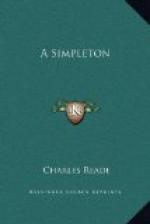“It is hard,” said Christopher, sadly. “But have a little patience. Society will come to you long before practice comes to me.”
About two o’clock one afternoon a carriage and pair drove up, and a gorgeous footman delivered a card—“Lady Cicely Treherne.”
Of course Mrs. Staines was at home, and only withheld by propriety from bounding into the passage to meet her school-fellow. However, she composed herself in the drawing-room, and presently the door was opened, and a very tall young woman, richly but not gayly dressed, drifted into the room, and stood there a statue of composure.
Rosa had risen to fly to her; but the reverence a girl of eighteen strikes into a child of twelve hung about her still, and she came timidly forward, blushing and sparkling, a curious contrast in color and mind to her visitor; for Lady Cicely was Languor in person—her hair whitey-brown, her face a fine oval, but almost colorless; her eyes a pale gray, her neck and hands incomparably white and beautiful—a lymphatic young lady, a live antidote to emotion. However, Rosa’s beauty, timidity, and undisguised affectionateness were something so different from what she was used to in the world of fashion, that she actually smiled, and held out both her hands a little way. Rosa seized them, and pressed them; they left her; and remained passive and limp.
“O Lady Cicely,” said Rosa, “how kind of you to come.”
“How kind of you to send to me,” was the polite, but perfectly cool reply. “But how you are gwown, and—may I say impwoved?—You la petite Lusignan! It is incwedible,” lisped her ladyship, very calmly.
“I was only a child,” said Rosa. “You were always so beautiful and tall, and kind to a little monkey like me. Oh, pray sit down, Lady Cicely, and talk of old times.”
She drew her gently to the sofa, and they sat down hand in hand; but Lady Cicely’s high-bred reserve made her a very poor gossip about anything that touched herself and her family; so Rosa, though no egotist, was drawn into talking about herself more than she would have done had she deliberately planned the conversation. But here was an old school-fellow, and a singularly polite listener, and so out came her love, her genuine happiness, her particular griefs, and especially the crowning grievance, no society, moped to death, etc.
Lady Cicely could hardly understand the sentiment in a woman who so evidently loved her husband. “Society!” said she, after due reflection, “why, it is a boa.” (And here I may as well explain that Lady Cicely spoke certain words falsely, and others affectedly; and as for the letter r, she could say it if she made a hearty effort, but was generally too lazy to throw her leg over it.) “Society! I’m dwenched to death with it. If I could only catch fiah like other women, and love somebody, I would much rather have a tete-a-tete with him than go teawing about all day and all night, from one unintwisting cwowd to another. To be sure,” said she, puzzling the matter out, “you are a beauty, and would be more looked at.”




